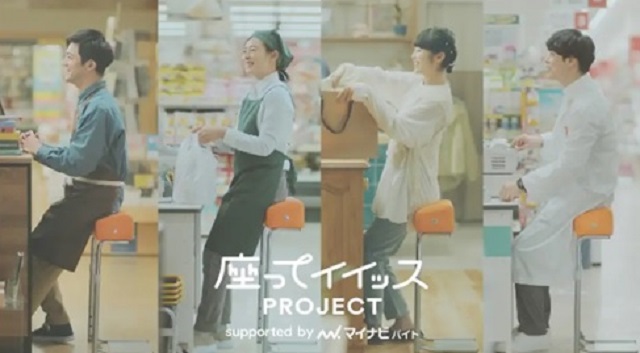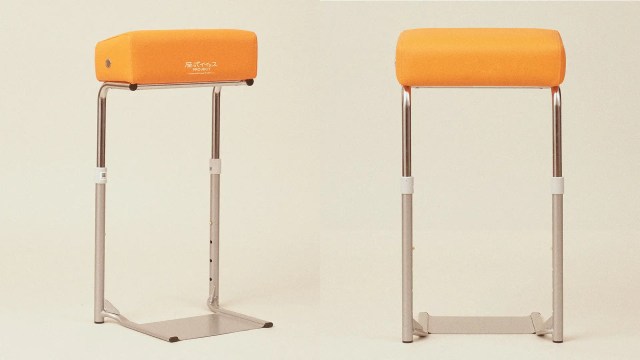Cashiers given chairs as Japanese companies reconsider if it’s OK for workers to sit during their shifts

Discount megastore Don Quijote takes part in the Suwatte Iissu Project.
Literature’s Don Quixote, through his commitment to the code of chivalry, is a character who’s more concerned with helping people than conforming to appearances. There’s a similar sentiment behind something that’s happening at Japan’s identically pronounced but differently spelled Don Quijote discount store chain.
Currently, Don Quijote’s company policy, as is the case with many retail sector jobs in Japan, is that cashiers must stand while working. As of the end of March, though some Don Quijote cashiers can now sit during their shifts.
Those workers, and their feet, can thank Japanese human resources/staffing service company My Navi, which spearheaded the initiative as part of its Suwatte Iissu Project, a play on words between suwatte ii des (“it’s OK to sit”) and isu (“chair”). In a survey of 300 of its client companies, My Navi found that only at 23.3 percent of those workplaces did part-time employees sit during their shifts. 20 percent expressly prohibited them from sitting, and at another 24.3 percent, there was no rule against sitting, but employees stood, suggesting that they possibly weren’t provided with a chair to sit in even if they wanted to. The remaining 23.3 percent of companies said they had no centralized policy on sitting, leaving such decisions up to individual branches.
When companies where employees aren’t provided with chairs were asked why, 33.3 percent cited not wanting to leave a bad impression on customers, with the next most common reason, at 25.6 percent,, being nantonaku, meaning “somehow,” or that the policy was simply put in place without any concrete rationale behind it.

Meanwhile when My Navi surveyed 300 part-timer workers, 44 percent said that there are times when they’re working when they wish they could sit down, and 21 percent said they’d like to be able to sit all the time. At the same time, when the surveyed employers were asked how they felt about the idea of workers being able to sit, regardless of the current rules or norms at their companies, 73.3 percent said they think it’d be fine if their workers could take a seat.
Those feelings led My Navi to partner with office equipment maker Sankei to develop the My Navi Part-Timer Chair.

You’ll notice that it’s not a reclining, La-Z-Boy-like easy chair. You could even make an argument that it’s more of a stool than a chair, but it does allow workers to get their body weight off their feet. The design was chosen to make it easy for workers to go from sitting to standing quickly and easily, in the event that some situation arrives that requires them to do so. The lack of a back is likely to prevent slouching, with a slight forward incline to the seat also helping to maintain an attentive, eager-to-serve posture while sitting.
In that way, the My Navi Part-Timer Chair looks to balance workers’ desire for greater comfort with employers’ desire to maintain a customer-focused atmosphere in their stores. Even for those employers who’d really prefer that workers stand, there’s probably going to be an upside, when looking at the situation in whole. In My Navi’s survey, 15..9 percent of workers who aren’t able to sit said that fatigue makes it difficult for them to provide service with a smile to their customers. Another 12.4 percent felt their speaking style becoming rougher as they got tired, and 7.8 percent said that tiredness contributed to decreased concentration and more on-the-job-mistakes, all of which are things companies should want to avoid if their goal is for the shopping experience to leave a good impression on customers.
As part of a test program, My Navi has supplied certain Don Quijote branches, as well as those of shoe store chain ABC Mart and a handful of other companies, with My Navi Part-Timer Chairs. The employers will be monitoring how they affect the physical and mental well-being of workers for the rest of this month and next, after which they make decisions on whether to expand the OK-to-sit policy to other branches.
Source: PR Times, Nihon Keizai Shimbun, via Hachima Kiko
Top image: PR Times
Insert images: Pakutaso, PR Times
● Want to hear about SoraNews24’s latest articles as soon as they’re published? Follow us on Facebook and Twitter!
Credit:

0 comments: